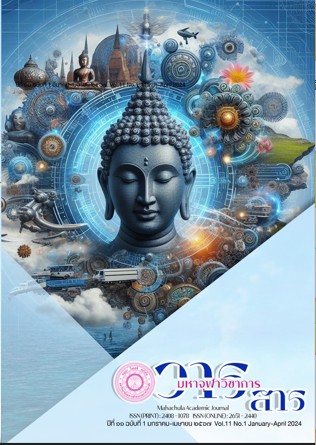An Analytical Study of Vipassanã Teaching of Phramaha Phumichai Aggapañño
Main Article Content
Abstract
The study entitled “An Analytical Study of Vipassana Teaching of Phramaha Phumichai Aggapanñño” consisted of the following three objectives: (1) to investigate the teaching of Vipassanā Kammaṭṭhāna (insight development) in Theravada Buddhist texts, (2) to explore the teachings guidelines of Vipassanā Kammaṭṭhāna by Phramaha Phumichai Aggapanñño; and (3) to analyze the teaching guidelines of Vipassanā Kammaṭṭhāna by Phramaha Phumichai Aggapanñño. The study employed qualitative research method by studying documents and conducting in-depth interview with 17 key informants.
From the study, the following results were as follow: Vipassanā Kammaṭṭhāna according to Theravada Buddhist texts is practiced based on Mahāsatipaṭṭhāna (the Four Foundations of Mindfulness) as follows: (1) Kāyānupassanā (contemplation of the body); (2) Vedanānupassanā (contemplation of feelings); (3) Cittānupassanā (contemplation of mind); and (4) Dhammānupassanā (contemplation of mind-objects). The Vipassanā Bhūmi (six fields of Insight) comprise: Pañca-khandha (five aggregates); Āyatana (twelve sense-fields); Dhātu (eighteen elements); Indrīya (twenty-two faculties); Ariyasacca (four noble truths); Paṭiccasamuppāda (dependent origination). The teaching of Vipassanā Kammaṭṭhāna based on Satipaṭṭhāna by Phramaha Phumichai Aggapanñño focuses on having practitioners be mindful of the present moment and contemplate body, feelings, mind, and mind-objects until one realizes that all things are according to Tilakkhaṇa [(aniccatā (impermanence), dukkhatā (suffering), and anattatā (no-self)] and, therefore, let go of attachment. Form the study, practitioners see changes in the body (Kāyānupassanā), mind (Vedanānupassanā, Cittānupassanā), ethics, and wisdom (Dhammānupassanā). They have a better understanding of the practices and themselves, and they can control their emotions, both pleasant and unpleasant. They find it simpler to be happy, more difficult to be in suffering, and more mindful of problems. Practitioners may use it in their daily lives and happily coexist in a changing society.
Article Details

This work is licensed under a Creative Commons Attribution-NonCommercial-NoDerivatives 4.0 International License.
References
พระมหาภูมิชาย อคฺคปญฺโญ (มกรพันธ์). ป.ธ.๙ ดร. กระบวนการพัฒนาศรัทธาและปัญญาของพระนวกะ ด้วยหลักสูตรการอบรมพระนวกะของคณะสงฆ์ไทย. กรุงเทพมหานคร: บริษัท เอมี่ เอ็นเตอร์ไพรส์ จำกัด, ๒๕๕๗.
______. "สรุปจากบันทึกเทปคำเทศน์สอนในการปฏิบัติของพระมหาภูมิชาย อคฺคปญฺโญ". อัคคธัมมสถาน ราชบุรี. [๕ มีนาคม ๒๕๖๖].
______. “ผลการเรื่องผลการใช้โปรแกรมการเจริญเมตตาภาวนาที่มีต่อคุณภาพการนอนหลับของพยาบาลวิชาชีพโรงพยาบาลราชบุรี”. วิทยานิพนธ์พุทธศาสตรมหาบัณฑิตสาขาวิชาชีวิตและความตาย. บัณฑิตวิทยาลัย: มหาวิทยาลัยมหาจุฬาลงกรณราชวิทยาลัย, ๒๕๕๒.
มหาวิทยาลัยมหาจุฬาลงกรณราชวิทยาลัย. อรรถกถา ฉบับมหาจุฬาลงกรณราชวิทยาลัย ธรรมบท อรรถกถา ภาค ๑-๒. โรงพิมพ์มหาจุฬาลงกรณราชวิทยาลัย, ๒๕๕๖.
มหาจุฬาลงกรณราชวิทยาลัย. พระไตรปิฎกภาษาไทย ฉบับมหาจุฬาลงกรณราชวิทยาลัย. กรุงเทพมหานคร: โรงพิมพ์มหาจุฬาลงกรณราชวิทยาลัย, ๒๕๓๙.
สัมภาษณ์ผู้ทรงคุณวุฒิ สัมภาษณ์พระมหาภูมิชาย อคฺคปญฺโญ ป.ธ.๙ ดร. [๗ มีนาคม ๒๕๖๖].


